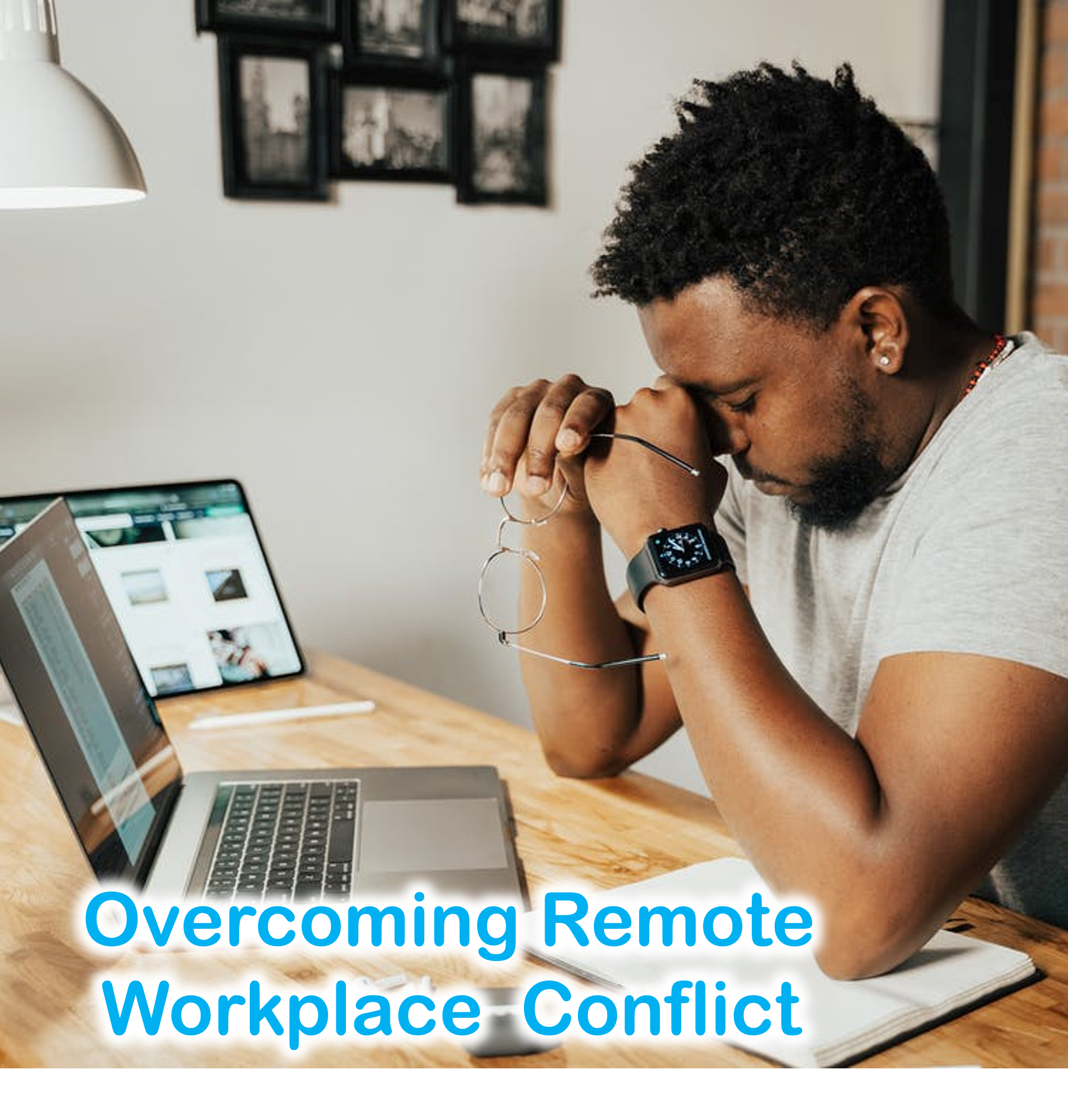Working Remotely: What To Do When You Experience Workplace Conflict.

Do you realize how common it is to have workplace conflict, even when working remotely? Recently (2021), My Perfect Resume surveyed 1,000 U.S. workers about the work conflicts they’ve experienced while working remotely. They found that “Eighty-one percent of remote professionals have experienced workplace conflict.”
First, what do we mean when we use the word “conflict?” The study found that lack of teamwork and general stress about work were common culprits. This was followed closely by rude behavior. Finally, lack of honesty, clash of values, and false accusations round out people’s troubles at work. This will poison organizations long term for their ability to maximize performance and improving workplace culture.
Peer and Manager Conflict
The majority of conflict people experience when working remotely is shown to be with coworkers. Sixty-five percent of those surveyed said that it was with a peer when they had an altercation at work. What about battling with your boss? Nineteen percent reported they had the most issues with the manager directly over them.
Perhaps most disturbingly, thirty-six percent of those surveyed said their bosses had been too aggressive in their text messages with them. Almost seventy percent of that group claim their bosses have actually cursed at them in those messages. This is one of the fastest way to disengage employees and to motivate them to leave the organization.
1 in 5 Employees Quit
In the end, when confronted with conflict, many (about half) try to talk things out to resolve the issues. But, nearly a quarter just leave the matter alone and never address it, which could foster more significant problems in the long run. They are also losing one in five employees to a work conflict as they end up just quitting over the issue.
Dale Carlsen, CEO of Ticket to Dream and a great mentor of mine, shared some advice that I continue to use to this day. He attributes his success to his father, Paul’s advice, “Surround yourself with great people, treat them well and make everyone successful.”
It’s about building up your team when they’re down and celebrating their wins for the hard-fought victories that they have accomplished. This mindset is key to making people successful. Not always happy, but successful. For example: when I tell my kids to finish their chores, I’m teaching them to complete a job and to do it right. They may not be happy about it at that moment, but the habits they form now will lead them to success later. I do this for them out of love.
3Ps to Creating Your Dream Team Remotely
Accountability is a powerful tool, and to be effective, it has to be rooted in love. Additionally to motivate your employees to become greater than themselves. I had many people in my life that went out of their way to mentor and guided me towards developing my success.
The 3P’s of Balanced Accountability are techniques to improve yourself as a leader and create your dream team tribe that will follow you everywhere you go.
P1: Personal Accountability
It’s based on the concept that at their core, employees want to follow their bosses and be able to look up to them. Because of this, supervisors and those in charge must lead by example and be a guideline of how to handle yourself when working remotely. They also need to set the tone for the organization and not start any conflict themselves. This takes developing self-awareness on a manager’s part. As your team, what you can do “more” and “less” of as a leader for them.
P2: Positive Accountability
Positivity is how good managers became great leaders. Actions speak louder than words. It’s about being positive when there are great things going on, but it’s also about being realistic when there is hard work to do. Creating a more positive work environment reduces turnover (remember twenty percent of employees reported quitting overwork conflict). Leaders must own this and start looking for small wins to celebrate. Then magnify those small wins to create a team that wants to repeat that same action.
P3: Performance Accountability
This area is the one most think of when actually using the word; accountability. It’s about coaching your employees to better work performance. When they are winning at work, you win too, and so do the rest of the employees. This ties into conflict as well because you can coach your employees on how to best deal with conflict. For example, you can encourage employees to stop and address conflicts as soon as they arise rather than letting them fester or gossiping about them. Conduct one on ones remotely with your team at least once a month and limit yourself from ever rescheduling this meeting. If you do reschedule, your team will only see that there are other things more important than spending time with them.
Don’t Manage. Lead.
To lead is to motivate, and the 3Ps of Balanced Accountability are designed to help you guide your employees toward improvement and reliability. You’ll find that showing genuine loyalty to your team can influence the way they perform. It will prompt them to do better. You’ll win their hearts and raise their standards all in one go. Putting the 3Ps in action and making others successful, is how you go from having just an average team to creating a high-performing dream team that will follow you anywhere.
Hernani Alves is a business accountability expert, Amazon best-selling author, and speaker that helps leaders build world-class teams. In his book, Balanced Accountability, Hernani reveals the framework needed to improve accountability in the workplace by winning hearts to maximize performance.
Get Your Free Checklist to Creating Peer-to-Peer Accountability
Take a moment to send Hernani a message on LinkedIn.
